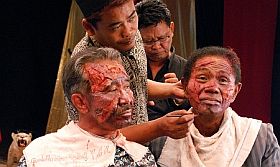


Ignacio Agüero: The Other Day
Shown at Cinema du Réel in Paris this year, awarded at Chilean Fidocs festival, selected for Yamagata at the coming October, and strongly recommended by my former EDN colleague, now at the NY based Flaherty Seminar, Anita Reher, the expectations were high, when I got the chance to watch El Otro Dia (The Other Day). I was not disappointed. Ignacio Agüero is a true auteur, who with a safe hand takes you into his film, well literally into his house, where his fascination with objects are cinematically conveyed so their beauty stands out in a constant play with light and shadow. Pure nature morte motives. Memories are around him, the past is present, the focus is on a photo of his father and mother embracing each other in 1945. A brilliant personal speak includes again and again questions regarding the father, who died without experiencing the consequences of the Pinochet dictatorship. What would he have said if he had seen that his sailor mates in the marine joined forces with the dictator?
Agüero films from inside to outside insisting on sequences that follow a cat climbing the tree or a bird taking a bath – he interrupts the interior scenes with wordless archive scenes from the Arctic – and he lets himself be interrupted by people ringing the doorbell. He opens the door, films the person outside and says that he is making ”a film about people who knock on my door” with the continuation, ”may I come and film you at your place”. In a completely different conversation-based documentary language he then goes to the drug addict, to the beggar, to the cleaning lady, to the postman… – all of them live in other parts of Santiago in poorer conditions than those of the director, who carefully puts in their home addresses on the map in his house. He leaves the house to come back again for the next doorbell ringing. It’s like being waken up by reality…
The film has many layers, it is rich, it is slow and goes for details, it has a sketchy form but is a totally controlled first person story that profits from Cinema’s possibility to jump in time, to go from out to in, and from in to out, from one style to another without losing the spectator’s interest and fascination.
Chile, 2 hours. 2 mins., 2013.
